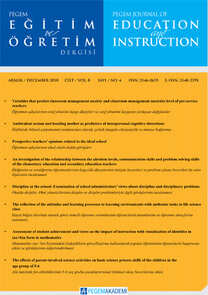A Comparison of the School Engagement Levels of Science High School Students Who do Sports and do not do Sports
A Comparison of the School Engagement Levels of Science High School Students Who do Sports and do not do Sports
___
- Alparslan, N. (2016). Anne babası boşanmış ergenlerin benlik saygısı ve okula bağlılık düzeylerinin incelenmesi. (Unpublished Master’s Thesis). Institute of Social Sciences, Sabahattin Zaim University, Istanbul.
- Amman, T., İkizler, C., & Karagözoğlu. C. (2000). Sporda Sosyal Bilimler. Istanbul: Alfa Yayın. pp.21-64
- Appleton, J. J., Christenson, S. L., Kim, D., & Reschly, A. L. (2006). Measuring cognitive and psychological engagement: Validation of the Student Engagement Instrument. Journal of School Psychology, 44, 427- 445.
- Arastaman, G. (2006). Ankara ili lise birinci sınıf öğrencilerinin okula bağlılık durumlarına ilişkin öğrenci, öğretmen ve yöneticilerin görüşleri. (Unpublished Master’s Thesis), Institute of Educational Sciences, Ankara University, Ankara.
- Arastaman, G. (2009). Lise birinci sınıf öğrencilerinin okula bağlılık (school engagement) durumlarına ilişkin öğrenci, öğretmen ve yöneticilerin görüşleri. Journal of Pamukkale University Faculty of Education, , 26(26), 102-112.
- Bellici, N. (2015). Ortaokul öğrencilerinde okula bağlanmanın çeşitli değişkenler açısından incelenmesi. Journal of Abant İzzet Baysal University Faculty of Education, 15 (1), 48-65.
- Can, S. (2008). İlköğretim 2. kademe öğrencilerinin schoola bağlılık düzeylerinin bazı değişkenlere göre incelenmesi. (Unpublished Master’s Thesis). Institute of Social Sciences, Ege University, Izmir.
- Ceyhan, A., & Can, G. (Dü). (2002). Gelişim ve Öğrenme - Fiziksel Gelişim. Anadolu University Publications.
- Conchas, G. (2001). Structuring failure and success: Understanding the variability in Latino school engagement. Harvard Educational Review, 71(3), 475-505.
- Dönmezer, İ. (2001). Ailede İletişim ve Etkileşim, (3. b.). Istanbul: Sistem Yayıncılık, p.120
- Duman, S., & Kuru, E. (2010). Spor yapan ve spor yapmayan Türk öğrencilerin kişisel uyum düzeylerinin belirlenmesi ve karşılaştırılması. Journal of Niğde University Physical Education and Sports Sciences, 4(1), 18-26
- Erdoğdu, M. Y., & Yüzbaş, D. (2018). Lise öğrencilerinin okula bağlılık ile genel öz-yeterlilik düzeyleri arasındaki ilişki. Journal of Suleyman Demirel University Institute of Social Sciences, 32(1)
- Fredricks, J. A., Blumenfeld, P. C., & Paris, A. H. (2004). School engagement: Potential of the concept, state of the evidence. Review of Educational Research, 74(1), 59-109.
- Furlong, M. J., & Christenson, S. L. (2008). Engaging students at school and with learning: A relevant construct for all students. Psychology in the Schools, 45(5), 365-368.
- Hill, L. G., & Werner, N. E. (2006). Affiliative motivation, school attachment, and aggression in school. Psychology in the Schools, 43, (2), 231-246.
- Ilgar, M. Z., & Parlak, K. (2014). Üniversite sınavına hazırlanan öğrencilerin okula bağlılık özbilinç ve girişimcilik özellikleri arasındaki ilişki. Journal of Istanbul Sabahattin Zaim University Institute of Social Sciences, 211-241.
- Jimerson,R.S., Campos,E., & Greif, L.J. (2003). Toward an understanding of definitions and measures of school engagement and related terms. The California School Psychologist, 8,7.
- Klem, A. M., & Connell, J. P. (2004). Relationships matter: Linking teacher support to student engagement and achievement. Journal of School Health,74(7), 262-273.
- Maddox, S. J., & Prinz, R. J. (2003). School bonding in children and adolescents: conceptualization, assessment and associated variables. Clinical Child and Family Psychology Review, 6 (1) 31-49.
- Marangoz, A. (2018). Spor yapan ve yapmayan lise öğrencilerinin boyun eğici davranışlarının farklı değişkenler açısından incelenmesi. (Unpublished Master’s Thesis). Institute of Educational Sciences, Gazi University, Ankara.
- Mengi, S. (2011). Ortaöğretim 10. ve 11 sınıf öğrencilerinin sosyal destek ve öz yeterlik düzeylerinin okula bağlılıklarıyla ilişkisi. (Unpublished Master’s Thesis). Institute of Social Sciences, Sakarya University, Sakarya.
- Osterman, F.K. (2000). Students’ need for belonging in the school community. Review of Educational Research. 17(3), 339.
- Sağlam, A. (2016). Ortaokul öğrencilerinin şiddet eğilimleri ile okula bağlılık düzeyleri arasındaki ilişkinin incelenmesi. (Unpublished Master’s Thesis). Institute of Educational Sciences, Dokuz Eylül University, Izmir.
- Serbest, Ö. (2019). Okul takımlarında görev alan lise öğrencilerinin okul aidiyet duygularının incelenmesi. . (Unpublished Master’s Thesis). Graduate School of Education, Trabzon University, Trabzon.
- Upadyaya, K., & Salmela-Aro, K. (2013). Development of school engagement in association with academic success and well- being in varying social contexts: A review of empirical research. European Psychologist, 18(2), 136.
- Yanık, M. (2017). Ortaöğretimde yapılan okul sporlarının öğrencilerin okula bağlılık düzeyine etkisi. Spormetre Beden Eğitimi ve Spor Bilimleri Dergisi, 16(1), 73-78.
- Yarımkaya, E. (2013). 12–14 Yaş arası ilköğretim öğrencilerinin özgüven düzeylerinin voleybolda servis atma becerisi üzerine etkisi. (Unpublished Master’s Thesis). Institute of Health Sciences, Selçuk University, Konya.
- Yılmaz Z. (2015). Ortaöğretim kurum öğrencilerinde okula bağlılık olgusunun başarı düzeyine etkisi. (Unpublished Master’s Thesis). Institute of Social Sciences, Okan University, Istanbul.
- ISSN: 2146-0655
- Yayın Aralığı: 4
- Başlangıç: 2011
- Yayıncı: Pegem Akademi Yayıncılık Eğitim Danışmanlık Hizmetleri Tic. Ltd. Şti.
Musli Ariani, Yazid Basthomi, Johannes Ananto Prayogo
The Effects of Differentiated Science Teaching According to the Grid Model
Tribhuwan Kumar, Venkanna Nukapangu, Ahdi Hassan
Sameera ALSHORMAN, Esra a ABU-NİJEM
A remedial course design on teaching teens and young adults in FLTE programmes
Eda ERCAN-DEMİREL, Hayriye ULAŞ-TARAF
Sarintan N. KAHARU, Jusman MANSYUR
Fatmanur ÖZTÜRK, Kürşad SERTBAŞ
Examination of Gifted Students’ Internet / Game Addiction and School Social Behaviors
Ayşin Kaplan SAYI, Filiz ŞAHİN
Development and implementation of mathematics attitudes scale for the primary and secondary students
